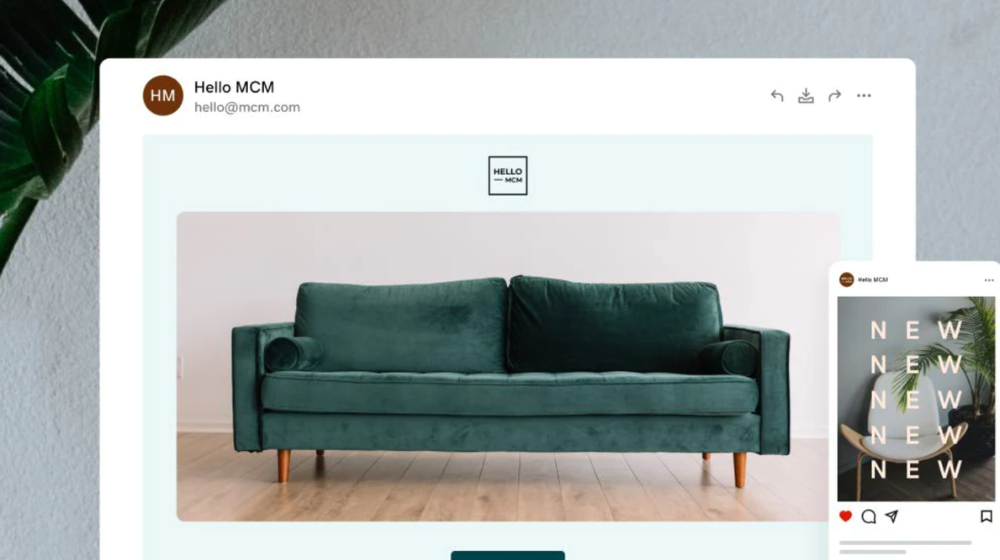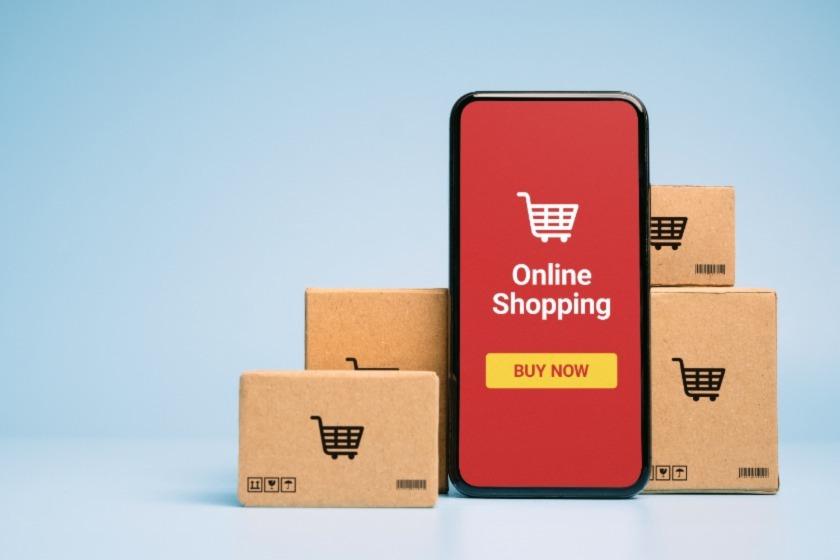When freelancing, you’ll definitely need an online presence of some sort to market your services. (Spoiler alert: handing out business cards is old-school, and not as effective.) Increasing your discoverability online is a great way to increase your volume of freelance work.
Your online presence could come in the form of a website or social media pages. It will take some effort to maintain, which will mean less time for pursuing your craft.
Not convinced? Then read on to learn why it’s important for freelancers to have an online presence, and some tips for leveraging your online presence to get work.
Why start an online presence if you’re freelancing?
Get a platform to engage with your fans
In the days of snail mail, showing off your work to people globally would have been really expensive, if not impossible. But this is now as easy as putting up an online profile and sharing the link to it.
And as you keep your fans updated on what you’re up to, who knows? They might just turn into your next freelancing client or buyer!
“When I share an artwork from beginning to end – the initial pencil sketches, insight into the ideas, the process of ink, the completion with paint, the presentation of the final artwork – these artworks often sell before they’re even finished!” writes New Zealand visual artist Lizzie Snow, who goes by the handle “fortyonehundred” on Facebook.

"I’ve definitely found a direct link between the amount of digital content I produce about a specific artwork’s journey with the speed in which it sells."
Have clients approach you for freelance work (not the other way round!)
Hitting up job boards can help you get freelance work, but wouldn’t it be nice to have clients come to you instead?
By building an online presence, you are broadcasting to the Internet that “Hey! I’m here, and I’m available for hire!”
And when someone in need of your services sees your website or social media posts, they might just get in touch.
From experience, this is a really nice change from approaching clients for freelance work and facing rejection (or worse, not hearing back at all).
Of course, this doesn’t mean you can set up your website or social media account and just expect leads to flood in. You’ll need to market yourself, too.
“Marketing is the best skill you can have as a freelancer,” says Demi Bernice, a freelance video creator from the Philippines.
All my clients are direct. I found them on social media platforms and I was also recommended to their friends.
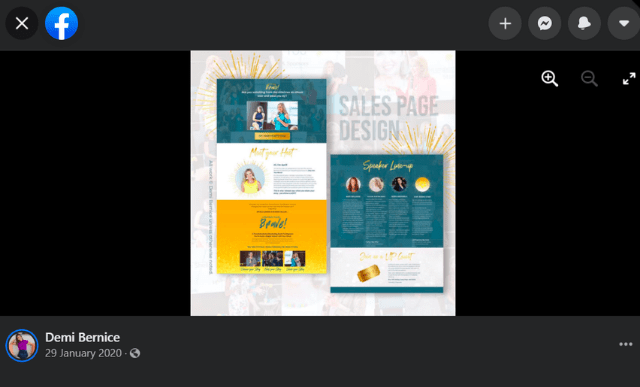
Qualify the leads that come your way
Getting inquiries from potential clients is great. But do you know what’s even better?
Receiving only inquiries that are a perfect match for your freelancing business.
That’s because replying to messages will take time—you don’t want to email a lead back and forth many times, only to find out that they:
- Can’t afford you
- Actually need a different service
- Have requests that you can’t fulfil
What a bummer.
So when you set up an online presence, you’ll be able to state exactly which clients you work with. This will help ensure that the leads you get are a good fit for what you do.
“Having a website not only helped me get more leads who are interested in my services, but most importantly, it also qualified most of the leads that came my way,” shares Muhammad Firdaus Syazwani, who provides freelance search engine optimisation and content writing services in Singapore.
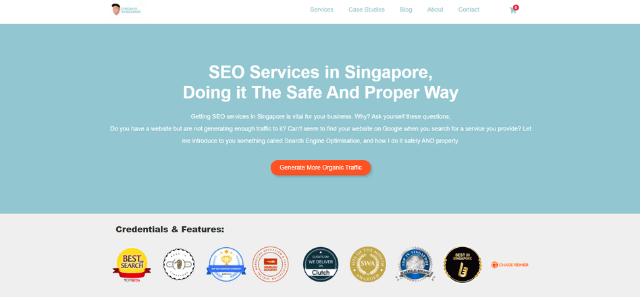
“Previously, I had to explain my services in detail and how my services can benefit their business. With a website and landing page dedicated to what I provide, businesses know specifically what they want and I can tailor my pitch accordingly—saving time and money involved.”
Editor’s note: If you’re excited to build your website, look no further. Get started with the GoDaddy Website Builder for free!
Tips for leveraging your online presence to get freelance work
Go for a professional look
The first impression matters. If your website or social media pages look sloppy, this could be a major turn-off for clients.
As a result, it’s a good idea to invest in well-designed, professional-looking collaterals for your online presence.
(Design not your forte? No problem. You could help a fellow freelancer out, and engage a freelance web or graphic designer for the job!)
For inspiration, check out the website that freelance copywriter from the Philippines April Alen Abion uses to market herself online:

Here are some things that I like about her website:
- An attractive colour scheme that is pleasing to the eye
- Plenty of photos of April—this makes her appear more human, and also helps clients know who they’re working with!
- It includes case studies of the results that she’s gotten for past clients, to illustrate her competence
- Clear call-to-action buttons that invite potential clients to contact her and get the discussions rolling!
Add testimonials for social proof
Let’s say that you’re hungry and are thinking of having dinner at either Restaurant A or Restaurant B. How do you decide?
I bet that what others are saying about both restaurants will influence your final decision.
For example, if online users write that Restaurant A’s food is amazing, while Restaurant B’s food is average, then you might just decide to head to Restaurant A for the evening.
Likewise, your website or social media pages should contain testimonials from past clients that sing praises about your work. These testimonials could just convince a potential client to hire you over someone else!
Malaysian freelance web designer Zahid Aramai has a dedicated testimonials page for his website:
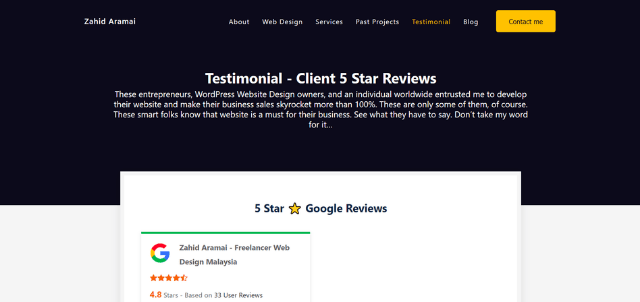
It’s a really long webpage, compiling testimonials from Google and the Upwork and Fiverr freelance platforms.
And when you click on the testimonials, you’ll be directed to their original sources—so there’s no way that he made them up himself.
This can be reassuring to potential clients, because some unscrupulous freelancers may fake their testimonials (please don’t do that).
Related: Four effective ways to get more customers
With an online presence, the world (wide web) is your oyster
Gone are the days where your pool of potential clients is limited to those living in your area. Thanks to the Internet, you can get clients pretty much from anywhere in the world now—and having an online presence is the first step to achieving that.
GoDaddy offers a Website Builder that helps anyone launch a website, even if they aren’t a technical expert. The service hosts your website for you, and also provides freely customisable themes so you can make your website truly your own.
The GoDaddy Website Builder is free for the first month, so use this period to test the platform and decide whether it’s a good fit for your freelance business.
One last thing: once you’ve set up your online presence, don’t forget to promote it to start attracting clients your way. Good luck!
Editor’s note: Got questions about putting your idea online? Get instant answers on GoDaddy Asia Facebook Messenger now.


